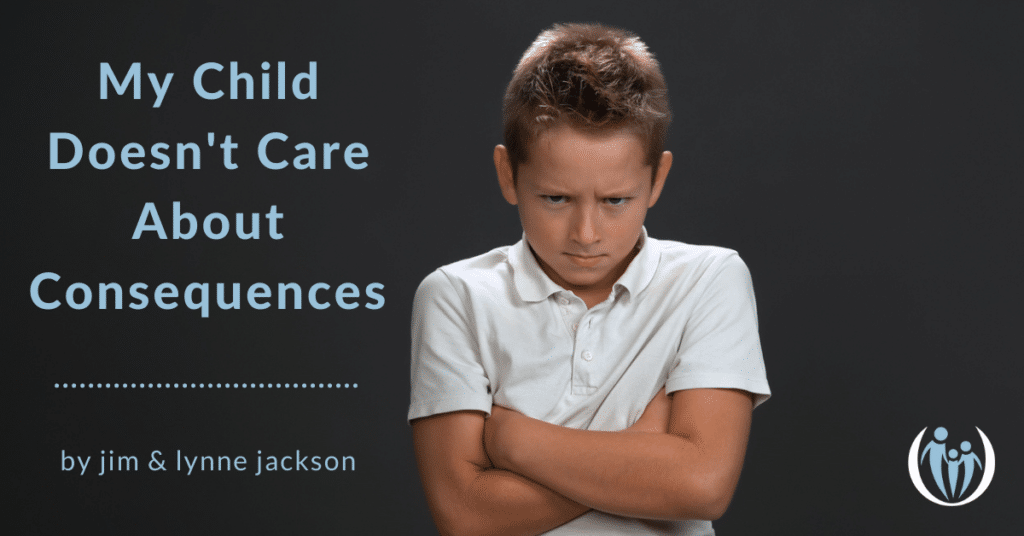
My Child Doesn’t Care About Consequences

You know the child that shows no remorse when you confront them about their behavior? The one that insists they don’t care, no matter what you say? You look for consequences to cultivate a sense of right and wrong. The problem is, this child doesn’t care about consequences. And the more you try to convince an “I-don’t-care” child they have messed up, the more they deflect, defend and even deny wrongdoing.
This might sound familiar to you. It’s familiar to many of us. It’s really discouraging when your child shows no remorse and acts like they don’t even care about the consequences.
Here’s the deal: They probably do care. In fact, quite a lot.
Look deeper: Kids that look like they care the least usually care the most.
“When we confront Devin about his behavior, he just acts like it’s not a big deal or blames someone else,” stated Patty. She and Carl were convinced that their ten-year-old son’s frequent lies and defensiveness were another sign that he didn’t care about them and their values.
They were skeptical when I (Lynne) stated, “The kids that look like they care the least, usually care the most, but are deeply discouraged.”
If your child acts like they don’t care about consequences, they actually may care quite a lot about what you think of them and their behavior. Sure, it doesn’t look like they care. However, defensive behavior is a sign of insecurity. In kids, it often cloaks the subconscious but powerful beliefs, “I am a failure and a disappointment, and therefore will be rejected.”
Imagine this: If you believe you are a disappointment and about to be rejected, you might pretend to not care either.
What we’ve seen is that parents respond to a defensive child by working harder to convince their child that the behavior is a problem, a BIG problem. After all, sin is a problem. You want your children to take this seriously rather than have an “I don’t care, “ attitude. You probably have good intentions about that!
Unfortunately, your efforts to demonstrate this to your kids may send non-verbals that communicate, “You are a big problem, and you’re ignorant if you don’t see your problem and fix it!” If your child was struggling with feeling like a failure already, imagine how that would feel.
It’s no wonder your attempt to communicate the seriousness of your child’s misbehavior often increases their determination to deny responsibility or wrongdoing.
“Or do you show contempt for the riches of his kindness, forbearance and patience, not realizing that God’s kindness is intended to lead you to repentance?”
Romans 2:4
Shift your goal: Create a safe space for confession
As Patty and Carl persevered at being more affectionate and encouraging with Devin, despite his difficult behavior, they saw a variety of positive changes in attitude and behavior. Then one night a breakthrough happened.
Devin locked his door so he could break the rules and play video games at bedtime. His dad stopped by twice to connect with Devin and both times he quickly hid the game, opened the door, and denied locking it. “The lock must be sticky… Really sticky.”
Though he was suspicious, Carl was intentionally loving as he visited with his son. As you’ll see, it was in this safe and loving space (instead of space where he felt defensive) that Devin began feeling the weight of his actions, instead of defensiveness against parental accusations and anger.
When you create a safe and loving space for your kids to consider their actions, it leaves room for God, through the Holy Spirit, to lead your child to repentance.
A little while later Devin left his dad a note, “Dad, I have something really bad to tell you.” When Carl came in, the “kid who didn’t care” unlocked a floodgate of tears, honesty, and remorse!
“I lied when I told you the door locked itself,” he sobbed. “I was playing video games.” It was clear that he did care, very much, about what he’d done. Carl listened gently and affirmed his honesty.
He later wrote a thoughtful note to his son, “Devin I am sad that you lied to me but I am proud that you made the right choice to admit your sin. It honors both God and me. It shows that you are maturing. I love you no matter what. You can always talk to me. Even if it is hard.”
Over the years Devin thrived in the care and encouragement of his parents and grew a strong value of integrity.
This is the kind of safety and connection that empowers kids to be honest and admit when they’ve messed up.
When people (of all ages) feel truly connected in a relationship and know that they will be loved no matter what, it becomes safe to admit struggles and failures, and the need for dishonesty dissipates.
Consequences That Actually Work
Take 15 minutes to learn how to give consequences that teach, rather than simply punish, by downloading our free ebook Consequences That Actually Work.
Change the cycle: Recognize the discouragement
If you and your child are stuck in a cycle of confrontation and defensiveness, it’s time for some honest self-evaluation: Does your response, when your child struggles, induce or reduce shame? When you confront your child, does the tone of your voice, expressions, body language, and even my words communicate a subtle (or not so subtle) message of, “You are a failure, a disappointment, and only loved when you behave well”?
While you probably don’t intend to communicate these messages, what counts is what your child interprets and then believes about himself. If your child shows no remorse or seemingly doesn’t care about consequences, stop and take some time to reflect on what messages your child might be receiving.
Practical ideas for change:
- Focus on connecting with, enjoying, and encouraging your child. Leave your child a note about things you appreciate about them and ways you notice growth and maturity. What are the most natural ways that you smile or laugh with your child, and how could you do that more?
- View an incident of defensiveness as an indicator of discouragement and insecurity, and an opportunity to communicate that you love your child no matter what. Put a discussion of the problem on hold until everyone is calm, and you know that “love has landed” on your child’s heart.
- Learn to gently ask questions: “How are you feeling about this? What do you feel good about? What do you wish you had done differently?” (Be sure to answer this question first for yourself.)
When parents set a tone of emotional safety and love, there’s no need for the defensive reactions of deception, blame or excuses that kids tend to make when someone is frustrated with them.
If you have a child who doesn’t care about consequences, makes a show of not feeling guilty, or refuses to accept responsibility, step into the shoes of your child. How might you respond to misbehavior with the compassion and restoration that is a “shame-reducer”? It’s a powerful opportunity for the gospel to come alive in your home!
As you give your child connection and grace-filled space, you may just find that child becomes less blaming and defensive, and more remorseful and repentant. It’s how our Father draws us to repentance.
“Or do you show contempt for the riches of his kindness, forbearance, and patience, not realizing that God’s kindness is intended to lead you to repentance?” Romans 2:4
Take 15 minutes to learn how to give consequences that teach, rather than simply punish, by downloading our free ebook Consequences That Actually Work.

